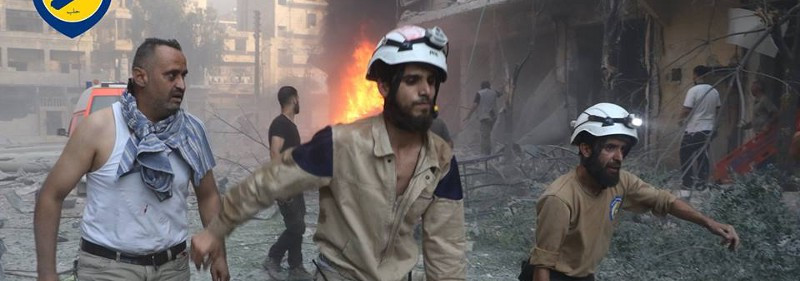Aid Workers in Aleppo: Restricted Access, Double Tap Strikes and the White Helmets
Published: Sep 8, 2016 Reading time: 5 minutes Share: Share an articleIt has been 2 months since any international aid has reached east Aleppo city, where approximately 300,000 people are living under daily bombardment and humanitarian conditions remain especially dire in the wake of a month long siege.

Prior to the siege, the route used by international aid organizations bringing in food and medical supplies cross-border was Castello road. When this route was cut by pro-Governent forces on July 7th, opposition forces launched an offensive to reinstate access to the eastern neighbourhoods at Ramousah neighbourhood. On the 6th August, opposition forces broke the siege and opened up a route via Ramousah road, however this road remains fiercely contested, frequently impassable and extremely dangerous.
At the time of writing, Ramousah road remains impassable as pro-Government forces have this week seized control over strategic vantage points including Um Qara Hill, Al-Mahrouqat Hill and Amrieh area, which are in direct firing range of the road. Anyone passing on the road now puts their life in serious risk. Humanitarians are prevented from bringing in aid via this route, unable to justify the risks to staff.
With this road rendered out of action, no food items or civilians are able to pass into or out of east Aleppo neighbourhoods and the population in the city is placed under siege conditions once again.
The population of east Aleppo was largely reliant on humanitarian aid and support even prior to the intense escalation of violence the city has witnessed since May this year. Today, 2 months after any international aid has been able to enter, the living conditions of those in east Aleppo city are at an all time low. Stocks of food, fuel and medicine are very limited, the bombing has intensified, the public electricity network is in ruins and no clean water is available for public use.
No-one is Spared
In the last week alone, various local humanitarian services in Aleppo east were hit. On the 24th August an airstrike on Ansari Mashhad neighbourhood impacted a local NGO-supported bread distribution centre, killing five people, wounding seven others and causing structural damage to the centre. Three days later, multiple barrel bombs were deployed onto Al Maadi neighbourhood killing two people and injuring twenty. After the initial attack, a further barrel bomb was dropped onto the same location, injuring a paramedic from a local NGO and damaging an ambulance that had arrived at the scene after the first attack. Such consecutive strikes on the same location are referred to as ‘double-tap’ strikes and have become a commonplace reality in Syria. Mourners, families looking for lost relatives and paramedics are the ones who suffer the most the double-tap strikes.
Among the first rushing to the scene in the aftermath of an airstrike are members of the Syrian Civil Defense — a volunteer organization also known as the White Helmets. These volunteers work in opposition areas and risk their lives on a daily basis trying to save those of people injured and trapped beneath the rubble. Approximately 3000 volunteers in 120 centres across eight governorates brave the double-tap strikes, rushing to the scene to save lives. Omran Daqneesh is just one of the 60,000 lives that the White Helmets have saved since 2013.
The first Civil Defense centre was established in 2013 inside east Aleppo city by a group of volunteers. By October 2014, nearly 70 centres had been established across the country and began working as one body under the name “Syrian Civil Defense”.
People in Need spoke with Ibrahim, a volunteer at the Syrian Civil Defense in east Aleppo to ask about the work they continue to do despite the risks they face. In east Aleppo, 47 White Helmet volunteers have been killed in action and an additional 80 have been wounded.
“I have been a volunteer at White Helmets since the end of 2013. As a cameraman, I have registered with my camera the most violent airstrikes and worst crises. The worst obstacles and difficulties White Helmets are facing are the lack of tools and equipment they need for their work and the multiple airstrikes conducted on previously-hit areas. Once, in Sukkari neighbourhood a warplane hit the same area with many airstrikes. I was injured that day while we were trying to save civilians. Another time in Amriah neighbourhood we faced the most fearful moment when a warplane conducted five successive airstrikes. In fact God protected us from death several times because of successive airstrikes hitting the same area.”
“I chose and volunteered myself for the White Helmets for the sake of humanitarian work and helping people. Civil defense volunteers feel great happiness saving people and bringing them back to life again although they risk their lives; they are very brave and worth our respect. I have never thought of leaving my job despite the many difficulties and risks. The people here and everywhere need us to be with them.”
PIN stands with fellow NGOs to repeat the call for all actors with influence over parties to the conflict to seek guarantees of unhindered freedom of movement of civilians, humanitarian staff and humanitarian supplies to Aleppo city as soon as possible. PIN, like many other aid organizations working cross-border from Turkey, are ready to deliver stocks of food aid into Aleppo city. We, like the people of Aleppo, are waiting for safe passage.



